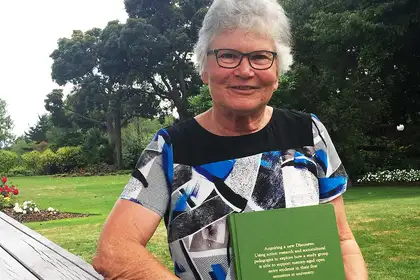
Dr Prue Fry, who conducted action research study groups for mature students to help them adapt to academic life.
Mature students need to be better prepared for the expectations, language, culture and technological demands of academia before they set foot in a lecture theatre, new research reveals.
Dr Prue Fry, a mature student herself, graduated last November from Massey University with a PhD in English for her thesis about a series of study groups she ran over three years for first semester mature students aged 25 to over 60. While anyone over 20 can apply to enter university under adult entry provisions, her findings highlight the value of tailored study preparation and support for mature students whose ideas about education, knowledge and even on how to write an essay date back to a different era. As well as academic writing skills, what they most need is an introduction to new ways of thinking and learning.
Many had experienced disrupted educational backgrounds but were highly motivated to pursue new careers and contribute to society through the second chance offered through open entry. But the reality of academia can be a culture shock. Some in her groups had been “falling apart” and in tears due to feeling overwhelmed by the unfamiliarity of university. Some were at risk of dropping out.
Rote learners to critical thinkers
Frequently, mature students’ understanding of education is largely based on memories of school when rote learning, one-way transmission of knowledge from the teacher to the class and feeding back the “right” answer in exams was standard. These days, learning – particularly in humanities and social sciences – centres on critical thinking, on discourse. But these terms can be like a foreign language for mature-aged university newbies. “Learning is a socio-cultural thing, not just a skills thing,” Dr Fry says. Even the notion of constructive argument in an intellectual framework can be baffling.
Dr Fry was struck by the stress many were under, particularly when it came to academic writing. Students told her; ‘There are words we know from the world, but at university they are used differently and have different meanings.’
In the study groups, she addressed their expectations about knowledge – what and how were they expecting to be ‘taught’? They discussed ideas about where knowledge comes from (elders? books?), and the modern idea of “constructing knowledge” – that is, that there are no right answers, just different perspectives. Peer support in sharing issues they had in common was vital too, she says.
Her action research project suggested that most participants “struggled initially to engage with university study because of their mismatched expectations for teaching and learning and an approach to knowledge recalled from their schooldays which were not compatible with what they encountered at university”.
“Many were unable to engage with their lectures,” she says. “They told me – ‘You sit there boggled, thinking, ‘what am I going to do with all this information?’”
University prep courses not widely pushed
During her study groups, she found out what the gaps were and worked to build their skills, knowledge and confidence. Unfamiliarity with the language and culture of academia was the biggest barrier. Her study groups covered everything from understanding academic terms to the basics of writing an essay, even defining what a paragraph is. Through an action research approach, she was able to develop, evaluate and refine her methods for supporting the study group participants in response to their needs.
The key thing for an effective study group is; “to know your students – and they are all different”. Student learning and orientation week workshops are useful for school leavers, as they all assume a little bit of knowledge, she says.
“My research suggests that while all participants had prepared themselves for university according to the knowledge and experience they had – preparing their households, employment, locations, and finances – very few had been aware of preparation courses or their value.”
Ethical issues in open enrolment
Accepting fee-paying mature students into a study programme without assessing whether they are equipped to cope with the requirements is an ethical and social justice issue, Dr Fry argues in her thesis.
She suggests many mature students could benefit from a one semester Certificate in University Preparation (CUP), available at Massey and other New Zealand tertiary institutions. However, she says, universities typically do not direct mature students to these courses.
Dr Fry understands the plight of the students involved in her research, having been on a similar journey when she returned to university as a mature student. Much had changed since pre-internet days when she was an undergraduate completing a Bachelor, then Master of Arts in English Literature in the 1960s. Since then, she’s taught at primary school level, as well as ESOL (English for Speakers of Other Languages) and tutored academic writing at Massey before doing doctoral research on a topic she is passionate about – empowering older learners.
She hopes her research will raise awareness among potential students as well as within tertiary institutions about the benefits of university preparation courses and prompt the setting up of study groups of the kind she has proven can make a difference – enabling mature students to find a sense of belonging and achievement at university.
(Massey University offers a Certificate of University Preparation – a full-time, one semester qualification available on all three campuses and via distance – through its Professional and Continuing Education (PaCE) unit, along with a range of foundation courses for English language, literacy and academic skills).